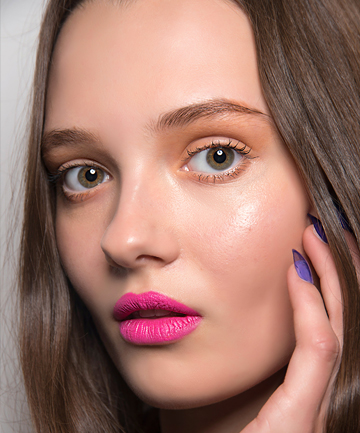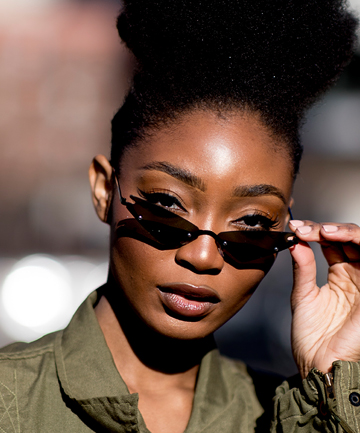Second to SPF of every dermatologist's "must apply" list is retinoids (which include both OTC retinol and prescribed retinoic acid).
"This ingredient works by speeding up the cell turnover process, therefore boosting the production of collagen and elastin," says Jeannel Astarita, aesthetician and founder of Just Ageless. "It is useful to refine pores, reduce hyperpigmentation, fine lines, and wrinkles, and to improve skin texture in general. It also works to clear acne."
The miracle ingredient comes with the downside that it doesn't mix well with the sun, which is why it's recommended for nighttime use. The primary reason why is because the sun essentially breaks it down, rendering it ineffective. Astarita also adds that wearing retinol during the day may cause your skin to be skin more sensitive to the sun given its potent exfoliating properties.
Image via Imaxtree
One of the best ways to protect yourself from free radicals — those pesky unpaired atoms that cause premature aging — is to wear products rich in antioxidants. Vitamin C is arguably the most potent out there, and it also helps to brighten and even out your complexion at the same time. Unfortunately, it's considered a "volatile" ingredient, meaning it degrades quickly. Formulators have spent big bucks inventing products that maintain vitamin C stability, but once the product is applied to your face it starts the process of breaking down. One of the best ways to combat this is to wear an SPF of 30 on top. This is true whether you're out in the sunshine for hours, at the office, or walking around on a cloudy day.
"People think the sun must be bright in order to cause damage, but you must wear sunscreen on overcast days, too," notes Dr. Scott Wrye, a plastic surgeon based in Reno, Nevada. "You will sunburn just as easily on an overcast day. Apply sunscreen every day of the year — rain or shine."
Image via Imaxtree
Salicylic acid is a beta-hydroxy acid (BHA) that's primarily used to treat acne-prone skin. It works by exfoliating the top layer of skin so that pores become, and stay, unclogged. Because of its exfoliating properties, it can cause the skin to be more sensitive. For that reason, it's best to use salicylic acid in the evenings and to always wear a layer of SPF 30 during the day while using salicylic acid, whether it's via cleanser, spot treatment, or mask. Without SPF — especially if you apply salicylic acid during the day and are exposed to the sun — you can experience burns, hyperpigmentation, and even premature aging.
Image via Imaxtree
If you have acne and aren't using salicylic acid as your go-to treatment ingredient, there's a high probability that you're using benzoyl peroxide instead. This acne medication helps with some of the deeper types of pimples versus whiteheads and blackheads, but it can also cause photosensitivity. It's best to use products containing this ingredient at night and to always wear SPF during the day to protect yourself from damage.
Image via Imaxtree
Glycolic acid is an AHA that also acts as an exfoliator. Its primary purpose is to help even out your complexion, improve clarity, and give skin that tell-tale glycolic glow. Like salicylic acid, benzoyl peroxide, and retinol, it's recommended as a night time treatment and should always be paired with SPF the following day.
Glycolic acid is also a very popular ingredient in facials and professional peels. The concentration of glycolic acid for such treatments is even higher than what you'll find in at-home products, so it's best to plan accordingly. In other words, don't get a glycolic peel the day before you go on a beach vacation, and do your best to steer clear of the sun the day-of and to reapply SPF religiously.
"Sunscreen then needs to be reapplied at least every two hours to provide you with protection," reminds Dr. Wrye.
Image via Imaxtree









